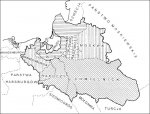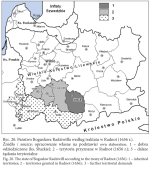There's also the Dutch to consider; they were the biggest mercantile marine (and navy) in the North Sea and the Baltic as of the 1650s and needed access to Poland for imports of grain for food and timber for their shipbuilding due to lack of these in Holland. They were in OTL extremely concerned at the prospect of any one Great Power dominating the region, as it could control access to these markets and charge them what prices it liked; they also did not want Charles X to push the Danes out of Scania and control the Sound and the entrance to the Baltic so when he attacked Denmark in 1657-8 they threatened to intervene. Hence as Charles X attacked Poland the Dutch were encouraging Frederick William of Brandenburg to make war on him not back him, and they tried to talk or threaten the British 'Lord Protector' Cromwell (who had the other regional large navy) into backing off from his initial support for Charles. (Cromwell believed Charles' 'spin' about a Protestant Crusade to defeat the 'international menace' of Catholicism in Poland and disliked Jan Casimir for employing exiled Royalists. But Cromwell primarily wanted Charles to sort out the Poles quickly and go on to attack his own foe, the Habsburg Emperor.)
If the planned partition of Poland in 1656 is able to 'stick' for at least a few years thanks to Charles and the Swedish/ Brandenburg alliance defeating Jan Casimir decisively, presumably George Rakoczki of Transylvania gets the Cracow region of S Poland(as the Habsburgs did in the actual 1795 partition and later after 1815) and Brandenburg the Poznan region, and Alexei of Russia gets what is now Belarus while Chmielnecki and the Cossacks secure an independent Ukraine region based on Kiev with C as 'Hetman'. Jan Casimir has to go into exile in Vienna, and Charles rules the centre and N of Poland as elected King with some dynastic claim to it through his mother's Vasa descent and seen as a useful strongman who can stop chaos but as a Protestant unwelcome to most of the nobility. (Technically indeed he is half German not Swedish so more used to politics S of the Baltic than most of the Vasa rulers.)
But I do not see the majority of the Polish nobles or the Church staying quiescent for long, particularly as he - like Henry V of England in Paris had he ruled there after 1422 - had other priorities at home and a need to deploy most of his army back in his own country to fend off other rivals. If Charles is trying to put down regional risings fomented by the Church which fears him looting its property, defeat raids by Cossack freebooters out of Chmielnecki's control, help the war-shocked nobility in ravaged Galicia by putting down peasant revolts, or stop ultra-Catholic risings by nobles incited by the Church he will be unable to return to Sweden in a hurry and will probably face a new Danish war for control of the Sound, backed by the Dutch or by the meddling Empire. If he does go home - and he has no brother or adult son to serve as his viceroy in Poland or Sweden and the original direct male line of Vasa is extinct in Sweden - then he has to trust suitable deputies to hold Poland together, and the regent there will have to be a Catholic to keep the nobles and Church happy; can he trust them?
In OTL another major war with Denmark in 1657-8 occurred anyway and the English and Dutch navies intervened in force to stop Charles swallowing up Denmark and saved its independence; an exhausted Charles was then short of money and allies and died early, aged 38, in 1660. Even with better health and a Polish army and treasury to back him, he would be hard pressed to keep both Poland and Sweden and it would be most likely that the Habsburgs would back some 'nationalist' Catholic noble and the Church in a regional revolt to diminish the threat that he posed to them with his militant anti-Catholic rhetoric (even if he used the latter mainly to encourage the English, Dutch and Lutheran North Germans to support him and in practice he would have had to accept Catholic allies to govern Poland). Possibly the Emperor Leopold or the Church would have encouraged George R to make a 'play' for all of Poland as champion of the Catholic cause as the weakened Swedish regime in Warsaw was unable to restore security and prosperity and Swedish courtiers and officers aroused local hostility. Or else border clashes between the Poles and the Cossacks in the East would escalate into war with demands being made that the Polish government intervene to stop 'persecution' of the local Catholics by Orthodox Cossack warlords and raiders. Chaos in southern Poland could also lead to increased opportunistic Ottoman and Crimean Khanate slave-raids and an angry feeling that Charles X's regime was failing to protect his people. The regime' s collapse into disorder and a revanchist Catholic revolt led by some militarily capable noble is probable for the mid-1660s if Charles dies and his young son (Charles XI of OTL, born 1655) succeeds under a regency; even if he is alive his survival long-term is dubious given the threat to Sweden from Denmark, the Dutch or (in Estonia/Latvia) Russia distracting his army.
The real-life Partitions succeeded at a politico-military level as the Polish state had deteriorated further by the 1790s and Brandenburg/ Prussia, Austria/ the Empire, and Russia were all much stronger then compared to the 1650s . As of then B-P is still small and short of men and money after the Thirty Years' War and Frederick William is a cautious consolidator not a gambler like Frederick the Great and there is no army or administrative 'machine' to work with - both were created in the early C18th. The Emperor has not reconquered Hungary from the Ottomans and that is his priority and if he sends a large army to Poland he could face an attack on Vienna; and Russia has not modernised under Peter 'the Great' though Alexei has updated his artillery and regiments and employs capable European officers in his army . Nor has Russia annexed and pacified the Ukraine (1667 and after, only finalised by Peter after Poltava in 1709); as of 1654 the Cossack freebooter 'state' there has just thrown off Polish Catholic rule and is an uneasy alliance of assorted local landowners and Cossacks, only united by dislike of Polish Catholic Church repression for the past few decades. If Charles X is bogged down in Poland in the 1660s Alexei could try to take over the 'Window on the West' via besieging Narva or Riga, egged on by the Dutch, but his army is no real match for the Swedes in a direct and equal clash - and the Polish-Lithuanian nobility is stronger and less demoralised than in the 1790s so if he tries to push West they can fight him more effectively and he will not secure the OTL 1795 Russian frontier.
So if we are to think of a potential equivalent to the real life Partitions frontiers, possibly the 1772 or 1793 frontiers preserving a weakened and exhausted Polish state under a post-Charles X national revival leader (George R or the young Jan Sobieski?), the best way of achieving that is a stronger and more Westernised Russia. That would mean avoiding the disasters and resource losses of the Time of Troubles and keeping a relatively secure and stable regime in place that can either import weapons and tactics from the West or else defeat the Crimean Khans and co-opt their large cavalry forces into the Russian army. Perhaps an Ivan IV who does not go insane (his wife Anastasia survives?) and does not turn on his elite, then leaves a competent son (his eldest son Ivan?) whose line is later replaced by Anastasia's Romanov kinsmen without a civil war or peasant uprisings. Alternatively, Boris Godunov succeeds in less controversial circumstances and does not face a famine or a pretender to the role of the deceased Czarevich Dmitri. Then Patriarch Filaret, OTL Czar Michael's father, does not enter the Church (forced by his enemies to keep him off the throne) but becomes Czar, and ruled to his death in 1633; the rather weak and ineffectual Michael is a short-term ruler and Alexei then modernises more ruthlessly than in reality from 1645? So Russia is a stronger military factor in the 1650s wars, and sweeps through the Ukraine and White Russia as far as Lvov/ Lemberg and Brest in the name of an Orthodox crusade?





